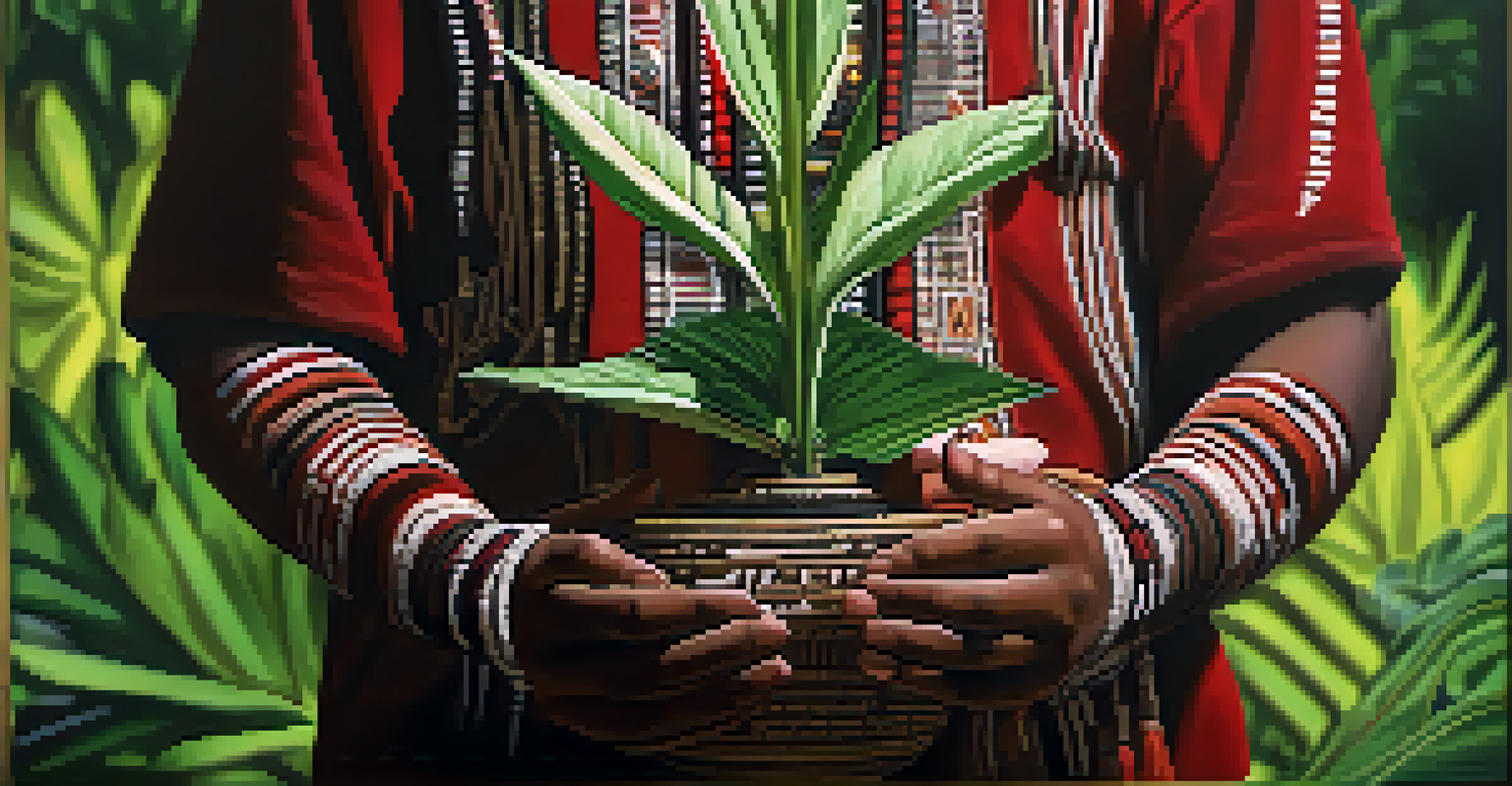Cultural Sensitivity in Entheogen Marketing Strategies

Understanding Entheogens and Their Cultural Relevance
Entheogens, substances that inspire spiritual experiences, have deep roots in various cultures around the world. Indigenous communities often use these substances in sacred rituals, highlighting the profound connection between the plant and its cultural significance. As the interest in entheogens grows globally, it’s crucial to recognize and respect these cultural contexts to avoid exploitation and misrepresentation.
Cultural appropriation can be defined as taking or borrowing from another culture without understanding or respecting the significance of what is being taken.
Many marketing strategies tend to overlook the rich histories tied to these substances, which can lead to cultural appropriation. By understanding the origins and traditional uses of entheogens, marketers can create campaigns that honor and respect these practices. This not only fosters goodwill with indigenous communities but also attracts an audience that values authenticity and cultural integrity.
For example, rather than using imagery that trivializes indigenous practices, marketers could highlight stories from those communities. By doing so, they not only educate potential consumers but also showcase the genuine cultural significance behind the entheogen, creating a more meaningful connection.
The Importance of Ethical Marketing Practices
Ethical marketing is essential in the entheogen space, particularly as products become commercialized. Marketers must ensure that their strategies don’t exploit or misrepresent the cultures they draw from. Successful brands prioritize transparency and authenticity, which can differentiate them in a crowded marketplace.

For instance, a brand might partner with indigenous communities to ensure that their narratives are accurately represented. This collaboration can lead to innovative marketing strategies that resonate more profoundly with consumers who seek ethical consumption options. Such partnerships also empower local communities, providing them with a voice and a stake in the conversation.
Cultural Respect in Marketing
Understanding and respecting the cultural significance of entheogens is crucial to avoid exploitation and misrepresentation.
Additionally, ethical marketing can enhance brand loyalty. Consumers are increasingly drawn to brands that demonstrate social responsibility, making it a win-win situation for businesses and communities alike.
Navigating Cultural Appropriation in Marketing
Cultural appropriation occurs when a dominant culture takes elements from a marginalized culture without permission or understanding. This practice can lead to negative stereotypes and a lack of respect for the original culture. In the context of entheogens, marketers must tread carefully to avoid commodifying sacred practices.
The best way to ensure the authenticity of your marketing is to work directly with the communities whose cultures you are representing.
An effective way to navigate this issue is to engage with cultural experts and community leaders during the marketing process. Their insights can guide brands in creating campaigns that honor the cultural significance of entheogens, rather than reducing them to mere products. This level of engagement demonstrates respect and a willingness to learn.
For example, brands could host educational events that celebrate the cultural history of entheogens. This approach not only educates consumers but also fosters a community around shared knowledge and respect, creating a more inclusive marketing atmosphere.
Engaging with Indigenous Communities
Building relationships with indigenous communities is vital for respectful entheogen marketing. These communities hold invaluable knowledge about the substances and their traditional uses, making their involvement crucial. By engaging with them, marketers can ensure that their representations are accurate and respectful.
One way to engage these communities is through collaborative projects that highlight their stories and teachings. This could include documentaries, blogs, or social media campaigns that feature indigenous voices. Such initiatives can create a richer narrative around the entheogen while providing a platform for those whose stories are often overlooked.
Ethical Practices Build Trust
Engaging with indigenous communities and prioritizing ethical marketing fosters trust and loyalty among consumers.
Furthermore, involving indigenous communities in the decision-making process can lead to more authentic marketing strategies. When these communities feel valued and respected, it fosters trust and builds a lasting relationship that benefits both parties.
Educating Consumers About Cultural Sensitivity
Consumer education plays a crucial role in promoting cultural sensitivity in entheogen marketing. As consumers become more aware of cultural issues, they can make informed choices about the products they support. Marketers have the opportunity to lead this educational charge by providing context and information about the cultural significance of their products.
Through blog posts, social media content, or in-store displays, brands can share stories that highlight the traditional uses of entheogens. This not only enriches the consumer experience but also encourages responsible consumption that respects cultural heritage. When consumers understand the roots of the products they purchase, they are more likely to appreciate and support ethical practices.
For instance, a brand could create an online resource that explores the cultural history of the entheogens they sell. By doing this, they empower consumers with knowledge, encouraging them to consider the broader implications of their purchases.
The Role of Storytelling in Responsible Marketing
Storytelling is a powerful tool in marketing, especially when it comes to entheogens. By weaving narratives that highlight the cultural significance and traditional uses of these substances, marketers can create a deeper connection with their audience. This approach not only informs but also inspires consumers to engage more thoughtfully with the product.
Brands can share stories from indigenous communities, emphasizing their relationship with the earth and the entheogens themselves. These narratives can provide insight into the rituals and practices that surround these substances, enriching the consumer’s understanding and respect. This storytelling approach can be done through various mediums, from video content to written articles.
Storytelling Enhances Connection
Utilizing storytelling to highlight the cultural narratives behind entheogens can create a deeper emotional connection with consumers.
Moreover, storytelling fosters an emotional connection, encouraging consumers to feel part of a larger narrative. When consumers see themselves in the story, they are more likely to support the brand and its mission, creating a loyal customer base that values cultural sensitivity.
Future Trends in Entheogen Marketing and Cultural Sensitivity
As the entheogen market continues to grow, so too will the importance of cultural sensitivity in marketing strategies. Brands that prioritize ethical practices and respect for cultural heritage will likely stand out in a competitive landscape. This trend is likely to shape the future of marketing in this space, pushing brands to adopt more responsible approaches.
Emerging technologies, such as virtual reality and augmented reality, offer innovative ways to educate consumers about the cultural significance of entheogens. These technologies can create immersive experiences that allow consumers to engage with the culture behind the product in meaningful ways. This not only enhances consumer understanding but also fosters a deeper appreciation for the cultural narratives involved.

In conclusion, the future of entheogen marketing will depend heavily on cultural sensitivity. By embracing ethical practices and engaging with communities, marketers can create a more respectful and informed marketplace that honors the rich traditions of entheogens.